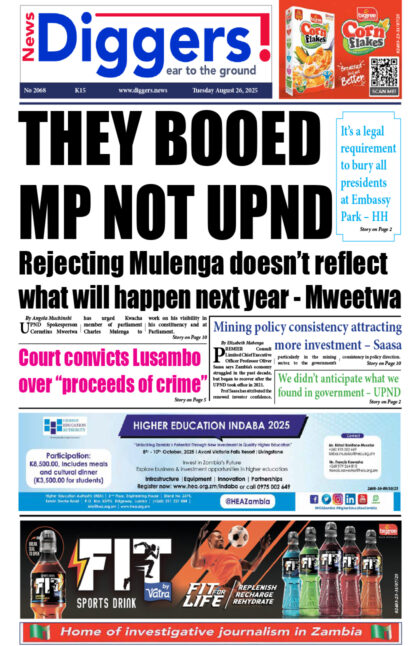LUKASHYA PF member of parliament George Chisanga says UPND should concentrate on actualising their campaign promises rather than trying to remove former president Edgar Lungu’s immunity.
And Chisanga says Zambia needs a culture of respecting former heads of state and only removing their immunity if there are justifiable reasons.
Meanwhile, Lusaka lawyer Dickson Jere says only a sitting head of state can move Parliament to remove a former president’s immunity.
Commenting on Sesheke UPND member of parliament Romeo Kang’ombe’s remarks that he planned to move a motion to remove Lungu’s immunity, Chisanga, who is also former Law Association of Zambia president, said the process to remove Lungu’s immunity was stringent.
“The problem with our country is that we are very politicised and that is what creates problems in dealing with anything that you would like to do. People resolve in one particular grouping and they view the other political grouping as an enemy group, and whatever they want to say to sound relevant, they will say it without giving it a thought. You know the Presidency is a very important institution in any country and anybody who suggests that we want to do something that is unconstitutional, people must stand up to defend the constitution,” Chisanga said in an interview.
“Firstly, there is a procedure that is prescribed in the constitution on how you can remove the immunity of the past president. It is not an easy procedure, the idea is to give the President constitutional protection; firstly when he is still in office and secondly after he is out of office. That is why that procedure is very stringent. Even in the way honourable Kang’ombe was suggesting it will happen, it is not the way it is contemplated in the constitution. I will just endorse what State Counsel John Sangwa said, that is the correct procedure of how you remove the immunity of the President.”
He said there was need to entrench a culture of respecting heads of states once they leave office, unless justifiable circumstances were brought to the table.
“It should not even be the talk right now, whether we should be removing the president’s [immunity] because we have changed government. I think the government that is in office now must concentrate and focus on meeting the aspirations of the Zambians by delivering on the promises that they gave. They campaigned on the basis of the promises that were very clear, that were very visible,” said Chisanga.
“Every time the current President was doing his campaigns, they were very clear on what they wanted to do and none of them suggested the removal of immunity and to bring it in front of the agenda is quite an unfortunate development. But the point to make is that it is quite a difficult thing to do and we should try and entrench a culture of respecting heads of states once they leave office, unless there are very justifiable circumstances of making that move.”
Meanwhile, Jere said only the sitting President can go to Parliament and present a detailed report with specific allegations against the former president.
“Unlike the lifting of Immunity of former president Frederick Chiluba (2002) and Rupiah Banda (2013) which was done with ease in Parliament, the law has now changed since 2016. See Article 98 of the Constitution. In Chiluba and Banda cases, a wide range of unsubstantiated allegations were made in Parliament, which prompted MPs to lift residential immunity without verification of the allegations. And it was by mere simple majority vote by Parliament! But now the law has changed. The following pointers must now be followed for lifting Immunity: It is the sitting President himself who should go to Parliament and present a Report detailing the specific allegations against the former president. (Rupiah Banda was done by Minister of Justice). The allegations must be specific and Parliament is obliged to set-up a special Committee to probe the allegations before tabling them in the House unlike in the Chiluba and Banda case. The former president, unlike previous, is allowed to challenge and be heard at Parliament before lifting of immunity,” Jere said in a Facebook post, Monday.
He said the removal of former president’s immunity was lengthened following the unsuccessful prosecution of past heads of states.
“So, if the allegations are fake, the committee will inform Parliament and the whole process fails! Lawyers get involved at this stage like in the US during congressional hearing of impeachment of the President. If the committee finds that the allegations are valid, Parliament will still have to vote for lifting of immunity and the motion requires a two-thirds majority unlike in Chiluba and Banda cases where you just needed a simple majority. Once immunity is lifted, the former President ought to [be] charged with those specific charges or alleged offences that Parliament approved and nothing else,” said Jere.
“In both Chiluba and Banda cases, they were charged with other unrelated offences not presented to Parliament. If acquitted by the Courts, immunity is given back automatically by operation of law unlike in the Chiluba and Banda cases. The effect of the above entails that the former President must be investigated first and prima facie case found against him before contemplating to lift immunity. There is no law that stops law enforcement agencies from investigating former president but prosecution. The process has now been lengthened following the unsuccessful prosecution of Chiluba and Banda. No ordinary MP or Minister can move Parliament to remove immunity unlike in the past. It must be the President.”
























